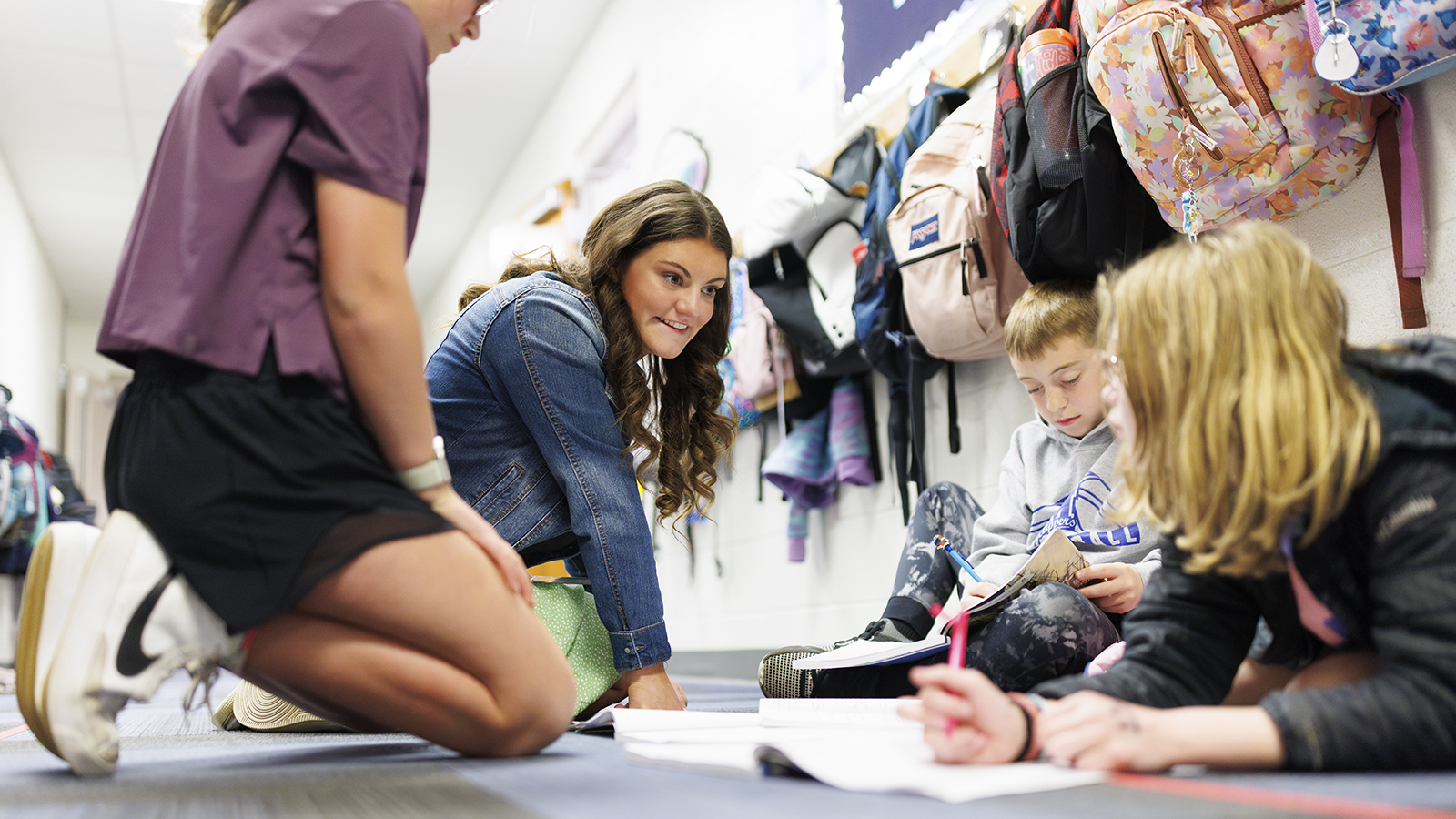
Huskers make big impact on state through teacher education
21 Aug 2024 By Deanna Gayman, University Communication and Marketing
Thousands of children are back in school, and they were likely greeted by a teacher with a degree from the University of Nebraska–Lincoln.
Nearly one in four new teachers in the state of Nebraska earn their degree from UNL. Among the May graduates who are now first-year educators is Madison Wosk, a fourth-grade teacher in Sutton, Nebraska, who grew up in Broomfield, Colorado.
“I’m having a bit of the jitters,” Wosk said from her classroom, as she prepped for the new school year — and her career — to begin. “But the level of preparation at UNL is amazing. I know I have the right tools in my tool belt, and the UNL education program really has prepared me to be the best teacher I could be.”
The university is the top producer of educators in the state. According to data from the Nebraska Department of Education, from 2015 to 2022, 24% of first-year teachers are graduates of UNL, followed by the University of Nebraska at Kearney at 18%. Overall, UNL grads comprised 17% of all Nebraska teachers in 2023. Of the 27,514 K-12 teachers employed during the 2022-23 school year across the state, 4,733 have a UNL degree.
This trend is seen in public school administration as well. One in five of all principals, superintendents, assistant principals and assistant superintendents are UNL grads.
The University of Nebraska system has produced 45% of all educators teaching in Nebraska public schools and 62% of the top administrators.
The contributions of the university in developing K-12 educators are seen in Nebraska’s rankings at number 14 and number 9 for public education by U.S. News and World Report and WalletHub, respectively.
“Everyone has had a teacher who changed their lives — every farmer, parent, banker, engineer, doctor and neighbor,” said Nick Pace, interim dean of the College of Education and Human Sciences. “We might not realize their influence or the things they taught us until many years later, but the impact of great teachers is undeniable. Preparing committed, resilient, passionate educators is foundational to our college and to the kind of future we want to live in.”
The journey to become an educator for a UNL student starts almost immediately in a K-12 classroom, said Loukia Sarroub, professor and chair in the Department of Teaching, Learning and Teacher Education in the College of Education and Human Sciences.
“There are five practicums, and one is a pre-professional practicum, and that happens during their freshman or sophomore year,” Sarroub said. “Our UNL students are placed in a school with a practicum supervisor right away so that they can be sure that teaching is what they want to do, and they begin thinking like a professional in the school setting.”
More practicums follow, depending on whether a students will go into elementary or secondary education. Practicums typically mean two to five half-days in classrooms each week during a semester, and some practicums include two full days. Aspiring teachers at UNL commit to as many as 600 classroom hours before graduation, including a final semester of student teaching, and a robust 120 credit hours of coursework.
“Our teacher education programs are excellent,” Sarroub said. “I think other institutions have tried to have a similar model to us, but we do stand out in some ways because we have more practicum, especially for elementary education, and we have more experiential learning than any other program.”
Rachel Morros came to Nebraska from Mission Viejo, California, specifically because she felt the elementary education program was more well-rounded compared to other universities she considered. As she starts the school year as a third-grade teacher at Campbell Elementary in Lincoln, she reflected on how the intentionality of the program has impacted her. Morros said that the breadth of courses — covering topics from special education to educational psychology and multicultural education — also helped her understand better the socioeconomic diversity she encountered while student teaching at Campbell, a Title I school.
“Being in our practicums and juggling our other classes and gen eds felt long and hard most days, but once I got to student teaching, I realized that that was helping me to go into teaching, and I wasn’t blindsided by it,” Morros said.
Similar in-classroom time and experiential learning are part of the programs that produce special education, agriculture and music teachers, whose degree programs are housed in the College of Education and Human Sciences, College of Agricultural Sciences and Natural Resources and the Hixson-Lied College of Fine and Performing Arts, respectively.
Tori Thomas, who grew up in Lincoln and will begin her career as a social studies teacher at Lincoln Northeast High School, said that the practicums were significant in her preparation for teaching in her own classroom this year.
“I’ve always been a hands-on learner, so being able to get into the classroom on day one, student teaching, thinking about lesson plans — all of those things were really helpful for me,” Thomas said. “That firsthand experience prepared me for my own classroom and prepared me to be a leader figure.”
Experiential learning can also include the opportunity to work on research projects and be part of UCARE projects with faculty members.
“The mission of UNL is still distinct from other institutions in the state in that it has a land-grant mission that complements its research highly intensive designation as a member of the Big Ten,” Sarroub said. “Our students are taught by instructors who are also researchers and expanding knowledge about teaching, education and education policy.
“Our students collaborate with faculty on educational research, attend research conferences and are mentored by faculty who are well known in their fields.”
College of Education and Human Sciences
Special Education and Communication Disorders
Teaching, Learning & Teacher Education
Strong Communities